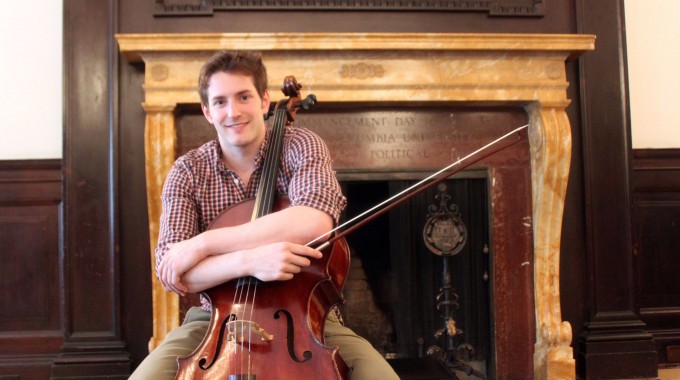If you know of a Columbia College student, faculty member, alumnus/alumna or program we should spotlight, or if you would like to submit a story, please contact:
Columbia College
Office of Communications
cc-comms@columbia.edu

“From performing, I’ve realized that the arts and human interaction offer temporary reprieves from suffering, if not lasting cognitive benefits.”
Lukas Matern CC’14 started playing cello in nursing homes in his hometown of Rochester, Minnesota in 8th grade because it gave him an opportunity to hone his musical talent. Nine years later, Matern still plays in nursing homes — not only for practice, but to see the joy and healing that music brings to the residents.
“I started cello in 7th grade and was still pretty new at the instrument, so I wanted a setting with a willing and perceptive audience,” Matern says. “They always enjoyed it so much and a concept was forged in my mind between healing and music.”
Today, Matern, a pre-med music and biochemistry double major, volunteers once a week at Amsterdam Nursing Home in Morningside Heights, where he has branched out from his role as a performer and into the hands-on field of recreational therapy — a role that has influenced his decision to become a doctor.
This decision was reinforced the summer before his junior year, when Matern worked at St. Luke’s Hospital, now called Mt. Sinai St. Luke’s, where Matern had the opportunity to assist in clinical research in local Emergency Departments through the Academic Associate Program (now a part of the Sinai Research Associate Program).
“My experience at St. Luke’s was very different from my work in nursing homes, and after that summer I had a very clear vision of the direction that I wanted to go in medicine,” Matern said. “I realized that I would rather work bedside than in a lab.”
As a result, Matern has become increasingly interested in doctor-patient relationships. Last year he wrote an article for the Columbia Science Review about the application of narrative medicine programs, which focus on the individual stories of patients, their illnesses and the healthcare professionals that assist them, and the benefits for both physicians and patients. In many ways, he believes his pursuits in music and the arts have informed his approach to such topics.
Matern was born in Germany to a doctor and musician before moving to the States at the age of five. While he was always inspired by the amount of meaning his parents derived from their respective careers, Matern considered fields such as paleontology and marine biology before uniting his parents’ passions to forge his own path.
Along with his pursuits in medicine he has continued to delve into music as a member of the Columbia University Orchestra for all four years at the College. He has also found time to play in various student ensembles and to take lessons at the Manhattan School of Music through the Columbia Music Department’s Dolan Prize, a scholarship that allows students to study with teachers that are not on the Columbia faculty. He highlights playing at Carnegie Hall in a chamber music ensemble as one of his favorite College memories.
“I think there’s a mentality at Columbia that whatever you want to get out of your college experience, you can,” Matern says. “And I definitely latched onto that.”
In the fall, Matern will be attending the Pritzker School of Medicine at the University of Chicago, where he plans to continue participating in and soaking up the cultural opportunities and musical outlets afforded to him by living in a metropolitan community. Matern can’t say for sure what he’ll pursue after acquiring his M.D., but he knows it will involve a field of medicine that is centered around forging a doctor-patient relationship based on hands-on care and face-to-face interaction.
“From performing, I’ve realized that the arts and human interaction offer temporary reprieves from suffering, if not lasting cognitive benefits,” says Matern. “I have [nursing home] residents come up to me after I play and say, ‘That meant so much. Thank you.’… I want to bring this kind of individual connection to my work as a doctor.”